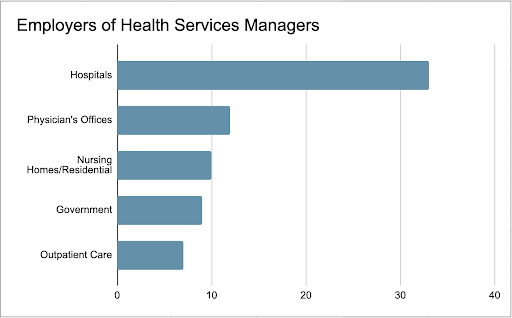What Does a Health Services Manager Do?
MHA Search
For the 2023-2024 academic year, we have 112 schools in our MHAOnline.com database and those that advertise with us are labeled “sponsor”. When you click on a sponsoring school or program, or fill out a form to request information from a sponsoring school, we may earn a commission. View our advertising disclosure for more details.
Behind every functional healthcare delivery system is a health services manager. Health services managers have the organizational, legal, and financial knowledge that clears the way for doctors, nurses, and other healthcare providers to do their jobs efficiently, effectively, and within the auspices of ever-changing healthcare policy and law. Health services managers also understand the complex landscape of insurance and can help a facility, department, or practice serve patients as best as possible within that complexity.
Because of an aging Baby Boomer population, the need for healthcare services in upcoming years will continue to increase, leading to a rise in demand for professionals who can successfully manage the systems in which care delivery occurs.
According to the United States Bureau of Labor Statistics (BLS 2021), this increase in need means that health services managers will be in high demand over the next decade. Between 2020 and 2030, the BLS predicts that employment opportunities for health services managers will increase by 32 percent nationally—more than three times the national average and that of all positions nationally (8 percent). This growth is predicted to result in 139,600 new health services manager jobs in the period. What’s more, with women occupying 59 percent of health services manager positions, this career path is forecasted to hire more women in leadership positions.
To become a health services manager, one needs, at a minimum, a bachelor’s degree in public health or a health-related administrative field such as health information management or healthcare management. Some employers prefer or require a master’s degree, such as an MHA or MBA. A higher-level degree may make a health services manager applicant more competitive, even when a bachelor’s degree is the stated minimum.
Health services managers complete all the important behind-the-scenes work that makes healthcare accessible and possible to patients. Read on to learn more about what it means to work as a health services manager.
Health Services Manager Job Overview
Health services managers are responsible for coordinating and ensuring the smooth implementation of the many moving parts that ensure that patients receive and providers administer effective care. Health services managers may work at the level of an office, a department, a specialization, a facility, or an entire healthcare network depending on their experience and expertise.
Health services managers can work in all divisions of an organization, including personnel management, development goals, efficiency and quality improvement, financial management, financial planning, infrastructure development, compliance, public relations, and internal communications. In addition, some health services managers work primarily with healthcare providers, some work with insurance providers, some have patient-facing roles, and many work in a blend of all three realms.
Health Services Manager Specializations
Often, especially in small office settings, health services managers are expected to be generalists. However, in larger organizations, there may be several health services managers, each focusing on the specific aspect of organizational functioning.
Care Coordination
Health services managers who coordinate care are responsible for creating work schedules for healthcare providers, coordinating the delivery and quality of services provided by individual providers or provider teams, and monitoring the capacity and usage of healthcare facilities. Care coordinators may also work directly with patient feedback or concerns. Health services managers with care coordination specializations may work in a specific area or with several different teams and supervisors throughout a healthcare facility.
Finance and Budget
Health services managers who focus on finance can have a wide range of responsibilities, including overseeing the processes by which finances are tracked and recorded, ensuring operations are functioning within budgetary constraints, creating projections for future fiscal needs, monitoring patient billing and payments, and presenting financial realities to supervisory boards. In addition, health services managers work with healthcare provider financial departments in handling the complexities of corporate accounting.
Health Information
With the ongoing and widespread adoption of digital medical records, health information managers are responsible for ensuring that offices maintain compliant records and that all patient data is kept secure. In addition, health information managers must keep up-to-date knowledge on changing technological landscapes and may be responsible for training personnel on proper digital information conduct.
A primary responsibility of health services managers with a health information technology specialization is making sure that electronic health record storage and access procedures and policies follow the health insurance portability and accountability act (HIPAA).
Legal and Policy Compliance
Health services managers specializing in compliance focus on keeping abreast of how changes to policy or laws will impact the facility they manage. These specialists are often responsible for creating, implementing, and training staff on how to comply with changes to local, state, and federal laws as they relate to healthcare delivery.
Health services managers with this specialization should be prepared to communicate legal jargon in clear terms with all sectors of a healthcare facility and their management teams.
Insurance
Health services managers whose specialty is insurance are those who cultivate an understanding of insurance deep enough to work with billing, reimbursement negotiation, contract renewals, documentation compliance, and patient access. In addition, health services managers may interact with insurance company personnel, upper-level provider management, and patients.
Personnel
A health services manager specializing in personnel or human resources will be responsible for recruiting, training, supervising, and retaining staff in healthcare settings. To recruit the most highly-qualified people for long-term employment, health services managers with personnel specializations can expect to network within other healthcare providers and travel to healthcare organization seminars.
Operations
Considered an all-in-one leadership specialization, health services managers specializing in operations are trained to see the overall health of an organization. They oversee the inner workings of facilities, human resources, marketing, and finances. In addition, health services operations managers work with many departments to coordinate the business side of healthcare facility management to ensure an organization is running efficiently in order to create a healthy working environment for its employees and patients.
Quality Care
Health services managers specializing in quality care are devoted to the employee and patient experience. Their primary area of focus is gathering data about the people working and being treated in a healthcare facility. They may interact directly with employees and teams or patients and their families or ask questions about their working and treatment experiences. Quality care managers also gather data via surveys and other research collection methods and write reports that illustrate their findings to senior-level management.
Health Services Managers Employers
Because all settings within healthcare require some form of management, the range of employers for health services managers span a broad spectrum. According to the BLS (2021), the most common employers of health services managers are as follows:

Health services managers may also find employment in pharmaceutical companies, health IT companies, and insurance companies.
Health Services Manager Daily Responsibilities
No two health services managers will have the same daily tasks because of the broad range of specializations, workplaces, and management needs. One health services manager may find that their daily tasks may vary beyond what is listed here, or responsibilities may evolve throughout their careers.
Daily tasks of health services managers can include, but are not limited to:
- Creating budgets
- Helping patients access care within the limits of their insurance
- Communicating with insurance company representatives
- Planning and implementing staff meetings
- Billing for services
- Scheduling providers
- Customer service
- Creating intake and training flows for new employees and new patients
- Case management
- Researching compliance
- Training staff to adhere to new policies or laws
- Researching new data management strategies or systems
- Training staff to adjust to changes in information management systems
- Fostering communication between administration and staff
- Performance reviews
Health Services Managers Work Environment
Most health services managers work in an office setting. However, depending on their role in the office, some health services managers have an administrative position, where much of their time is spent on a computer, on the phone, or completing behind-the-scenes tasks that enable their place of employment to continue to run smoothly.
Other health services managers have positions that are primarily people-facing roles. They spend much of their time in conversation with leadership, providers, insurance, or patients, discerning the best way to balance different parties’ needs within an established medical system and determining the best way to improve these systems based on the needs of the people.
Many health services managers, especially those working in small practices, experience a blend of people-facing and administrative tasks. They may find that part of their workday is spent in an office, with the rest of their work time spent in one-on-one or group meetings.
Professional Resources in Health Services Management
Except for those working in nursing homes or assisted care facilities, most health services managers do not need certification or licensure to work. There are, however, many professional organizations that can provide a health services manager with a professional network, educational opportunities, and insights on how to problem solve or innovate within their role.
The following are examples of some of the professional organizations available to health services managers:
- American Association of Professional Coding (AAPC)
- American College of Healthcare Executives (ACHE)
- Commission on Accreditation of Healthcare Management Education (CAHME)
- Health Care Administrators Association (HCAA)
- Healthcare Business Management Association (HBMA)
- Medical Group Management Association (MGMA)
- Professional Association of Healthcare Office Management (PAHCOM)
- The American Association of Healthcare Administrative Management (AAHAM)
- The American Health Information Management Association (AHIMA)
- The Healthcare Financial Management Association (HFMA)
- The National Association of Healthcare Access Management (NAHAM)
- Women in Healthcare Management (WHCM)

